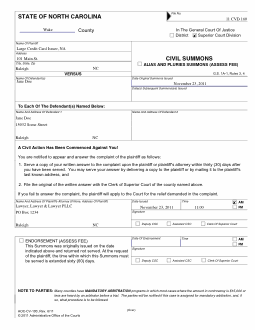Options When Facing A Collections Lawsuit
Whether it involves a credit card, a hospital bill or other medical bill, or another personal loan, collections lawsuits against consumers have one thing in common: a creditor is demanding money from a person who is unable or unwilling to pay. By filing suit, the creditor seeks a judgment which will entitle them to use certain legal processes to obtain money or property from the defendant consumer. A summons and complaint, served on the defendant, starts the process for the lawsuit. Often, receipt of these documents leads the consumer to ask what they should do?
Below, I outline one's basic options for dealing with an ordinary collections lawsuit. These options aren't necessarily mutually exclusive, are stated somewhat generically, and some may need to be exercised soon after the lawsuit starts to be effective. Contact us to discuss how you might approach your particular circumstances.
1. Fight the Lawsuit
In collections lawsuits, sometimes the suit is entirely baseless and sometimes the debt is undeniable. More often, the lawsuit sits somewhere in middle. There might be questions about the exact amount of the debt, who has the right to collect the debt, or the age or continued viability of the debt, just to name some examples. The plaintiff creditor in a collections lawsuit has the burden of proving to the court that the debt is owed from the defendant to them. However, as a practical matter, they only have to provide proof if the defendant consumer insists they do so. Occasionally, a creditor will unable or unwilling to make the effort to prove their case in court.
If one is unsuccessful in fighting the lawsuit, a judgment will result. It's possible that added costs might make such a judgment larger than a judgment that would have been entered by default if one did not fight. If one is successful there may not be a judgment at all, or the judgment may be for a reduced amount. Careful counsel by an attorney can assist you with deciding if the facts of your case suggest the possibility of a favorable outcome, including the availability of defenses and consumer protection counterclaims.
2. Resist Post-Judgment Collection
Having a judgment entitles the creditor to use certain mechanisms to force the debtor to pay. Options for judgment creditors in North Carolina include seizing money in bank accounts, having sheriffs collect and sell personal property, or going after value in real estate. A judgment becomes a judgment lien upon the debtor's property, which makes it difficult to sell or obtain financing on the property, and enables the creditor to seek to foreclose and sell the property. In the general case, a creditor cannot garnish wages under North Carolina law.
Debtors are not without recourse to resist execution of a judgment. Most importantly, judgment debtors are entitled to claim property exemptions under state and possibly federal law. Common exemptions allow a North Carolina resident to prevent a creditor from seizing a home, a car, and household property, provided that value of each is within the statutory exemption allowance. These exemptions are for the most part the same as those used in bankruptcy proceedings. A debtor must affirmatively claim their exemptions in order to benefit from them, and there is a time limit for that claim that will arise after judgment in the execution process.
Someone who is able to completely resist collection, due to the value of their property and assets, is often referred to as judgment-proof. However, judgments remain enforceable in North Carolina for an initial period of ten years, so resisting collection may be an on-going effort for a judgment debtor.
3. File Bankruptcy
Bankruptcy provides strong tools for dealing with collections lawsuits. Generally, the filing of a bankruptcy creates an automatic stay which will halt any on-going collections lawsuit. If the debtor receives a bankruptcy discharge, most consumer debts will be eliminated, along with any judgments associated with those debts. Bankruptcy may also be effective at removing judgment liens from property, depending on property value and other factors. Both chapter 7 and chapter 13 bankruptcy can resolve judgment debts, so which chapter is best depends on other aspects of a debtor's finances.
One does not pick-and-choose debts to include in a bankruptcy. Bankruptcy involves the debtor's entire financial life. Accordingly, it is often an attractive option for an individual facing numerous collections lawsuits. Similarly, individuals with debt difficulties beyond collections lawsuits may find it most efficient to concentrate effort in one place and file bankruptcy.
- Log in to post comments




